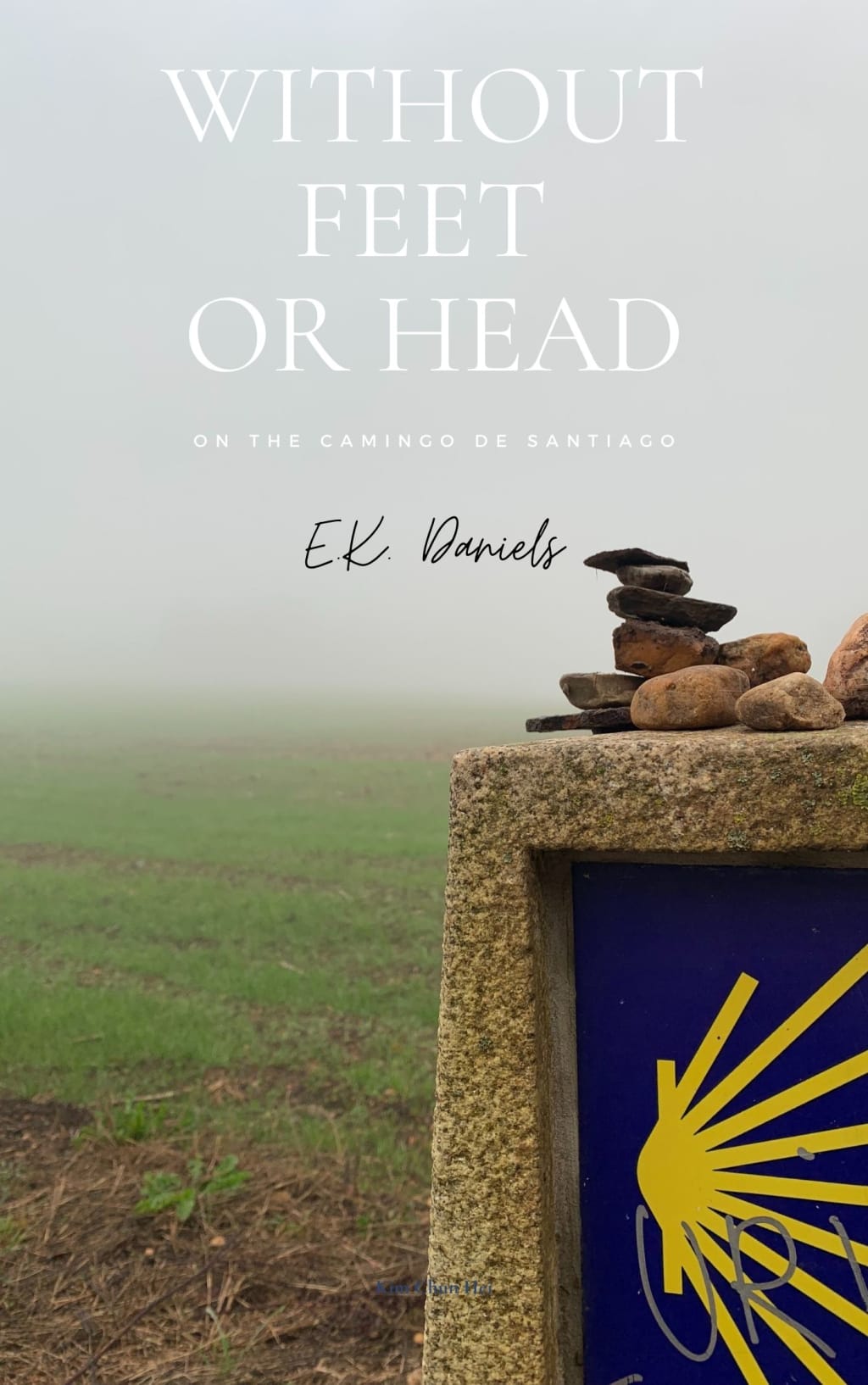Without Feet Or Head.
One woman’s journey along the Camino de Santiago.

This is love: to fly toward a secret sky, to cause a hundred veils to fall each moment. First to let go of life. Finally, to take a step without feet.
-Rumi
They said to start as close to the end as possible, so this is where she started. The remnants of her possessions packed squarely into a modest backpack, the stitching already frayed along the bottom despite it still holding its new price tag.
Towel, toothbrush, notebook, pen, passport. The smell of smoke seeped through the entirety of the bag’s contents.
It was all she could salvage, but was probably for the best. Coupled with the weight of her grief, she didn’t need any more to carry on her back.
The end was her beginning. 117 miles away from the ashes of Santiago, the final stretch of the Camino. To an outsider, it may have seemed poetic to take a pilgrimage from ashes to ashes, but to the girl, it was simply a very long walk away from what was once her home.
Flecks of gold retreated to the ground on a bed of frosted grass. Her shoes cut through thin layers of ice before leaving their imprint on the soil.
She watched her breath paint the empty space in front of her, grateful for the extra layers she was wearing. The path ahead was quiet, save for the crunch of twigs and errant splashes when her feet met an odd puddle.
Her friends jokingly deemed her a gringa loca, crazy for taking pilgrimage in the dead of winter.
“Why would you want to walk 117 miles in 5 days?” “That’s practically a marathon per day.”
Indeed it was.
“Won’t your feet hurt?”
Some questions were more poignant than others.
The miles stretched on, each one weighing heavier on her hamstrings. Her face scrunched in discomfort, the furrowed brow and anxious tightening in her legs a sign that she must soon find a bathroom. Walls optional.
She assumed the coast was clear and reached for the toilet paper tucked between her notebook.
Radical self-reliance was the modus operandi on the Camino, and she was okay with that. It was something to which she had long been accustomed.
Don’t take up too much space. Leave a place as if you had never been.
Always feeling like she occupied one too many atoms anyway, this wasn’t a hard ethos to accommodate.
Never quite feeling like she was home, the woman was well acquainted with the notion that it was something which you inhabited for a short time. And you were never too attached.
In that way, the Camino fit her like a glove.
You could only carry so much weight on the way to Santiago.
The fog lay dense across the landscape, a contrast to the arid barrios of the cities to the South. It was as if someone had taken various shades of verdant—emerald, sage, pine—and painted swaths across the terrain. Like a watercolor, brick blended into cobblestone until the path ahead diffused into the whole.
She didn’t need to see that far ahead of herself anyway. At this stretch, the way was mostly well-marked. Despite its saunters with merely more than an hórreo for corn, the yellow arrows which beckoned the way were a regular fixture. If not occasionally in unexpected places.
“To get to the treasure, sometimes you have to follow the trash,” she thought with a smile, noting a bright yellow <-- emblazoned on a local’s garbage can.
She hesitantly followed the path of the trashcan, finding it ironic that a harbinger of hope allegedly led to salvation. Perhaps for others, but for her, she was not so sure.
Despite her skepticism, she continued.
The only salvation expected was perhaps to be found in her cholesterol levels at her next doctor’s appointment.
Everyone delighted in talking about how healthy the Mediterranean diet was, but they had never encountered the real Spanish palette. If you could resist the siren’s song of Jamón Ibérico or Migas, then you possessed a strength unknown to mere mortals, of which our protagonist undoubtedly was.
Even the grapes were nestled amongst bits of pork fat.
Yes. If any salvation was to be found, it would be in the form of pounds, kilos or stones shed on the scale.
And yet, she chose to carry her stone from her home to her new destination. Meant to represent the penance of one’s sins, it was to be carried and left along the way. She chose to carry hers to Santiago, though she was sure atonement was not to be had.
The stone lay in her pocket. She rubbed it on occasion unconsciously, akin to how one might rub a lamp intent on summoning a genie. If she were granted three wishes, they would be simple:
1. Better shoes
2. Dry socks
3. A panacea from the foot pain.
The sun lowered in the sky, and the forest path was replaced by rock and village streets. She was in Palas de Rei.
The exchange of terrain was an unwelcome one for her feet. Each step cut like knives through her right foot. The pressure of the gravel on her shoes was unbearable, sending shockwaves through her ankle. The crackle of the pavement was a stark contrast from the soft soil.
Wincing in pain, she stopped for a moment of pause before attempting to place pressure on her foot again. She realized the crackle of her cadence was not only of the ground, but of her own making. The mysterious sounds a tell-tale sign of tendonitis.
She reached into her bag, hoping anti-inflammatory drugs would magically appear. To her chagrin, they did not. In earnest, she searched for anything to help shoulder the weight, now understanding why so many pilgrims had walking sticks. Remembering the pilgrim’s adage ‘the Camino would provide’, though not quite convinced, she looked around for a sturdy tree branch that she could use as a makeshift cane.
Several hobbles on the cobblestone and into the neighboring village found her acquainted with her trusty knotted accomplice and the pad of soft in the woodlands of Northern Spain.
The relief was a temporary one.
Villages of favoring her right foot caught up with her body. Keen to ensure that her left foot was not left out, the muses gifted her with matching tendonitis in the other foot.
She was told once that “God will only give you what you can handle”. Thousands of miles from the ashen remains of what was once her home, she was not so sure.
Seeking out another walking stick, she took refuge by the river.
The elevation was breath-taking, but the water didn’t seem to notice as it flowed deftly downstream.
Eager for anything to take her mind away from her body, she reached into the depths of her bag to retrieve her notebook.
The uphill battle is the hardest. As I walk uphill, against the flow, it is more challenging. Water naturally follows the path of least resistance.
She made several more scrawls in her notebook before replacing the black elastic onto the paper and swaddling it back in its place. Her walk continued.
The miles stretched on, the landscape shifting from chestnut trees to rows of dead corn fields.
A grey disturbance interrupted the forest floor. She knelt down for closer inspection, noting a lone glove missing its mate. Although chances were good its owner was also on the way to Santiago, chances were doubtful they would meet up at Compostela. The glove remained untouched.
It was several miles before the woman encountered another pilgrim on the way, headed in the wrong direction.
“Has visto un guante?” he beckoned.
Searching the recesses of her brain for the meaning of the word ‘guante’, she finally understood this man was looking for his glove.
A spark of remembrance in her eyes, the woman apologized for her Spanish and hastily assembled a response before gently being gently stopped with his reply in her native tongue.
The woman tried to explain where the glove had been left, but knew it would have been impossible. And in the dead of winter, to be without gloves was like to be in a battlefield without armor.
It was only right to walk back the two miles to help the man retrace his steps.
Upon arrival at the stranded glove, they both stopped to eat. Protein powder and water for her, chorizo, and an orange for him.
The man reached into his bag and revealed a black notebook, seemingly identical to hers, though she doubted it held the smell of smoke within its pages. He scribbled into the journal, replaced the elastic, and outstretched his hand to offer the woman half of his orange.
She politely refused before remembering that learning to accept was part of her journey. If she was in search of her media naranja or other half, why not take that literally and accept the half-orange on offer?
They continued on their way, intent on getting to the next village before nightfall. Regretful of the pain of the extra miles packed onto her heels, but not for her newfound friend, the woman was eager to stop for the day.
Keeping mostly in tow with the man, she paused after an unusual silence of an additional pair of footsteps. Although he was not much taller than her, his weight carried a different resonance on the Earth. It was missing, like a rhythmic accompaniment which had stopped playing.
Turning around to inspect, the color drained completely from her face. The man lay flat on his back several steps behind.
Frantically searching for a pulse, she feared for the worst.
Attempts at CPR proved fruitless. The pilgrim disappeared as mysteriously as he had appeared.
Walking as quickly to the next village as her tendons would allow, the woman found her way to the local pharmacy, happy to see the signature green cross above the door.
The locals could not explain it. Doctors soon revealed it was a Glioblastoma. Brain cancer.
She sat in the hospital in disbelief, trying to wrap her head around the events. She hadn’t even known his name.
Desperate for understanding, she scrambled for her notebook. She cleaved the elastic band from its pages, her senses assaulted at the lack of smoky scent. It was his.
Pushing aside feeling like an intruder into the man’s innermost thoughts, she opened to the first page, hoping she may at least find a name to put to his face.
To her surprise, it was simply addressed, “a ti, peregrino”, “to you, pilgrim”. The journal was this man’s last record of his travels. A testament to his perseverance in the face of adversity. A message of hope and memories of a life well lived.
She flipped through the pages, stopping at what seemed to be a letter:
“Peregrino,
In the words of Chatwin, ‘Each totemic Ancestor, while travelling through the country, was thought to have scattered a trail of words and musical notes along the line of his footprints’.
It is my hope that my words are not scattered and my music not dissonant in my final days.
I will be following those little yellow arrows to my own ashes.
This is the way.
I do not have much in the way or worldly possessions, but I will not need them where I am going. Enjoy the sunsets with sangria, relish in the olives and the feel of the Spanish breeze on your neck, and please make this house your home."
She turned a page to reveal the deed to a stone cottage in Galicia. Modestly priced at €20,000 it was in need of a bit of love. Imperfect but charming, it was a work in progress. But so was she.
About the Creator
E.K. Daniels
Writer, watercolorist, and regular at the restaurant at the end of the universe. Twitter @inkladen






Comments
There are no comments for this story
Be the first to respond and start the conversation.